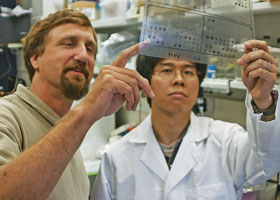Feature Story
Health Center Today, October 30, 2009
Geneticist Bruce Mayer Awarded Competitive NIH Challenge Grant
Research Uses a Molecular Diagnostic Approach to Classify Lung Cancers and Provide Useful Information to Guide Treatment
By Carolyn Pennington

Bruce Mayer, left, and Kazuya Machida.
Bruce Mayer, professor in the Department of Genetics and Developmental Biology, has been awarded a National Institutes of Health Challenge Grant. This is an extremely competitive award with nearly 21 thousand applications for the American Recover and Reinvestment Act program and only one percent of them being funded. Two other Health Center researchers also received the two-year, million dollar grant. Thomas Babor, professor and chair of the Department of Community Medicine and Health Care, will be studying the comparative effectiveness and feasibility of SBIRT (screening, brief intervention, and referral to treatment program) in a general dental clinic. Dr. Zihai Li, associate professor of medicine and tumor immunology, has received a Challenge Grant to study the novel chaperone mechanism for platelet disorder.
The Challenge Grants focus on specific knowledge gaps, scientific opportunities, new technologies, data generation, or research methods that would benefit from an influx of funds to quickly advance the area in significant ways.
Mayer and Dr. Kazuya Machida, an assistant professor in his lab, are working on a better way to classify tumor types so that cancers can be more effectively treated. "One of the most fundamental hurdles for the effective treatment of cancer is the heterogeneity of the disease," explains Mayer. "Because of the differences in the molecular details responsible for the development and progression of a particular tumor, there can be profound differences in the course of disease even for tumors that appear similar or identical by standard pathological analysis."
Mayer says the problem is becoming even more acute as new therapies target specific signaling pathways or molecules. Such targeted therapies may be successful for only a small percentage of tumors. Reliable methods to predict which tumors will respond are essential if such therapies are to be used effectively.
New diagnostic methods used to classify tumors and predict their response to specific therapies are being developed and hold greater promise for more effective cancer therapy. According to Mayer, such methods will allow the physician and patient to choose the best course of treatment, while avoiding ineffective or unnecessary treatments that diminish the quality of life for patients and financially burden the healthcare system.
In his research, Mayer is focusing on tyrosine phosphorylation which controls many of a tumorís key biological activities. Mayer believes that profiling the global state of tyrosine phosoporulation will likely provide a wealth of information that can be used to predict the behavior of the tumor. However, current methods to analyze tyrosine phosphorylation are not amenable to the comprehensive analysis of large numbers of human cancer specimens. So Mayer is proposing using a novel diagnostic method, phosphoproteomics platform or SH2 profiling, to profile non-small cell lung carcinoma (NSCLC) samples from patients.
NSCLC is a devastating disease that kills over 160 thousand Americans a year. Mayerís project will test whether SH2 profiling can be used to classify NSCLC for prediction and prognosis. The samples will be provided by Dr. Eric Haura, a thoracic oncologist at the Moffitt Cancer Center in Tampa, Florida, whose lab specializes in the disease. "If successful, these studies will set the stage for development of clinical tests that can be used to guide more effective treatment for lung cancer and other tumors," adds Mayer.


